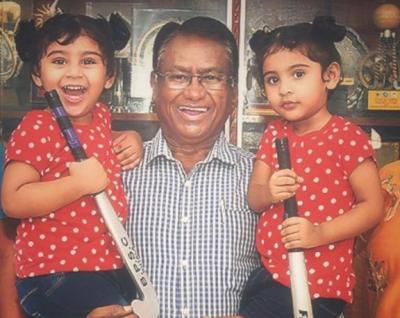By Qaiser Mohammad Ali
New Delhi, March 15 : For a man who was the 16th and last man to be selected in the Indian hockey team for the 1975 World Cup and for whom there was “messages from New Delhi” to the team management to “drop him” during the tournament, Ashok Kumar slammed in the title-winning goal that gave the country its first ever World Cup in Kuala Lumpur.
On the 46th anniversary of India’s lone World Cup triumph till date, 70-year-old Ashok Kumar on Monday recalled the heady days of final match against Pakistan that somewhat made up for not winning the 1973 World Cup despite India reaching the final – and losing to the Netherlands.
“India’s 1975 World Cup triumph had created a tehelka (storm) at the time. It makes us feel proud of our achievement. March 15, 1975, is indeed a historic day for Indian hockey. Before this win, India had been labelled as a team of silver and bronze medallists. With this triumph, we removed that label,” Ashok Kumar, son hockey wizard Dhyan Chand, told IANS on Monday.
For Ashok Kumar, the 1975 World Cup glory brought double satisfaction. He had been a member of the Indian team for the first World Cup in 1971 and also the second edition in 1973. On both occasions, India had come tantalising close to winning the title, finishing with a bronze in 1971 in Spain and losing to host the Netherlands in the final two years later.
“The defeat in 1973 final still haunts me, to be honest, as we lost on penalties after the score remained 2-2 after the extra time. In extra time, B.P. Govinda missed a penalty stroke in ‘sudden death’. The Netherlands won 4-2 in the penalties. It was well-balanced team, and the loss was a setback,” he recalled.
“When we reached Kuala Lumpur for the 1975 World Cup, the trophy was displayed in a case. I stood there and stared it for a while, as I was still ruing the miss of the 1973 tournament. That feeling hit me at that moment. I made a commitment to myself to give my best at the upcoming 1975 World Cup,” disclosed Ashok Kumar.
The man who played at right-in position said many people would come to watch the Indian team practice in Kuala Lumpur, and that made him further determined to not disappoint Indian fans.
During the tournament, India lost only one match in the group stage, to Argentina.
“I was pulled out midway through that match. Then, when we beat Germany 3-1 in a crucial group match to qualify for the semi-finals, there were messages from New Delhi to drop me from the team. However, the team management kept its faith and trust in me,” recalled Ashok Kumar. “Earlier, mine was the 16th and last name to be written on the sheet when the selectors picked the squad for the World Cup.”
In the semi-finals, India edged out host Malaysia 3-2 in extra time, and set up the final against traditional rivals Pakistan.
“Before the final, the entire team went to mandir, masjid, and gurudwara in Kuala Lumpur and prayed. In the final, when Pakistan took a one goal lead in the 17th minute, some of our players got disheartened. Surjit Singh equalised in the 44th minute. And then in the 51st minute I scored a goal that turned out to be the match-winning strike,” he said.
The moment Malaysian umpire G. Vijaynathan declared it a goal, Pakistani players protested and the game stopped for a couple of minutes, before resuming. But suddenly Pakistan started making one attack after the other. But Aslam Sher Khan defied all attacks and goalkeeper Ashok Diwan made some classical saves,” recalled Ashok Kumar.
After a series of felicitations in Kuala Lumpur, Singapore, Chennai, New Delhi, and other cities, when Ashok Kumar finally reached his home town Jhansi by train, it took him four hours to cover the three-km route from the station to his home. His best moment came on reaching home.
“When I reached home, ‘dadu’ (father Dhyan Chand) patted my back in appreciation. It was a rare occasion when he had touched me, since out of sheer respect for him I used to keep a distance from him. And, anyway, he had never encouraged us to take up sport as a career as the reward were few and far between, and he had seen all that,” said Ashok Kumar, who turned to coaching after retirement from the sport.
Diwan, who played his first full match in the final, rues missing out on the celebrations with the team immediately after the final.
“Immediately after the final whistle, Varinder Singh and I were taken to a room at Siaran Langsung Dari Stadium, Merdeka, for dope test. While Varinder got free soon after providing his urine sample, they made me drink a lot of water to help me give the sample. By the time I was, finally, free, the team celebrations were over,” Diwan, who was understudy to Leslie Fernandez in the team, told IANS.
In terms of rewards that the Indian team members received on returning home, Diwan said the players received Vijay Scooter at a felicitation event at the K.D. Singh ‘Babu’ Stadium in Lucknow and a Hero Cycle was delivered at the players’ homes.
The 16-member Indian team compromised five Railway players. They were Michael Kindo, Surjit Singh, Varinder Singh, Victor Philips, and Diwan.
Indian team: Leslie Fernandez, Ashok Diwan, Surjit Singh, Michael Kindo, Aslam Sher Khan, Varinder Singh, Onkar Singh, Mohinder Singh, Ajit Pal Singh, Ashok Kumar, B. P. Govinda, Harcharan Singh, Harjinder Singh, Victor Philips, Shivaji Pawar, and B.P. Kaliah
Disclaimer: This story is auto-generated from IANS service.

